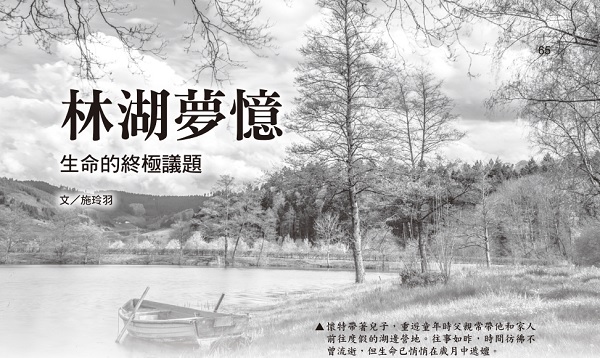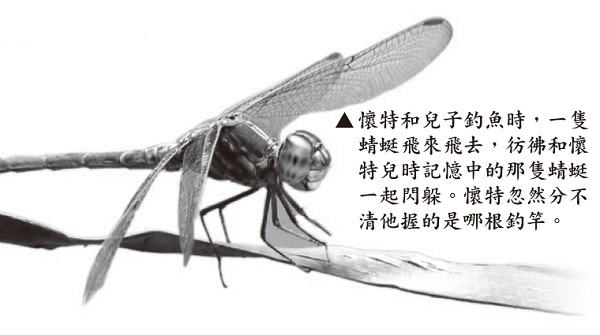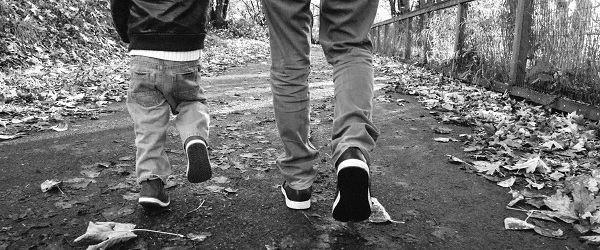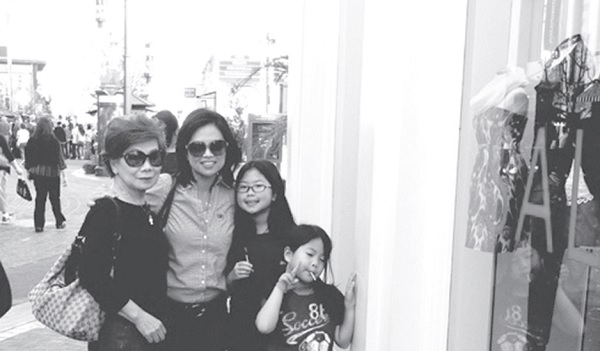Linhu Mengyi
The ultimate issue of life

▲White took his son to revisit the lakeside camp where his father often took him and his family to vacation during his childhood. The past is like yesterday, time seems to have never passed, but life has quietly passed through the years.
The past is like yesterday
Memory is not only a moment of existence, but also a lifetime of lovesickness. Why do people want to visit old places again and again? In addition to looking back on the past, do you also subconsciously hope that time will freeze and you can go back to the past and shake hands with your former self?
In the article "Once More to the Lake", EB White, a well-known contemporary American writer, describes that when he took his son back to his childhood, his father often took him and his family with him. A Maine lakeside campground for vacation. Through the description of the lakeside scenery and the inner feelings of the characters, the deep love between father and son between three generations is depicted. White cleverly overlays memories and reality, as if walking in a time tunnel. Sometimes people think that time is like a still lake, never passing; but the changes brought about by the years make him realize that the seasons of life are also changing. With the changes of nature, people will eventually face the ultimate issue of death.
White uses caring and delicate writing to describe his childhood vacation feelings, combining the shared memories of two generations of parents and children. The author's sadness and melancholy about the passing of time, through concrete image descriptions, bring readers to the quiet forest lake, and follow him with the searchlight of time to carefully think about the significance of time in the inheritance of life.
Past and present coexist
Recalling the summer mornings when he was vacationing at the lakeside as a child, White said he "always got up the earliest, put on his clothes quietly so as not to disturb others, and then slipped out into the fresh air and paddled his canoe..." Many years later, when he took his son back to the lakeside camp, he did not expect that his son would be in the same situation. "On the first morning, I was lying in bed, smelling the smell of the bedroom, and heard my son quietly sneaking out to row a boat and leaving the lake shore." White began to have hallucinations. Thinking that the son is him and he has become his father. This feeling of "seeming to be living in a double existence" caused him to be confused many times during the interaction with his son, thinking that it was not him who was speaking or acting, but his father. This realization made his hair stand on end.
Using a narrative technique as precise as a biological scientist collecting specimens, White describes taking his son to the lake to fish. The arrival of a dragonfly made him "sure without hesitation" that the fleeting years were just a mirage, and the past was like yesterday. "The same slightly rippling waves...the same boat, the same green color, the hull cracked at the same location, and the fresh water below the deck left the same remnants and debris." The father and son quietly stared at the end of the fishing rod, watching dragonflies flying around. go. The past overlaps with today, and the dragonfly that appears in front of White's son dodges together with the one in his childhood memories. The son stared at the dragonfly. It was White's hand that held his son's fishing rod, and it was his eyes that stared at the dragonfly. "I felt dizzy and couldn't figure out which fishing rod I was holding." White seemed to be performing a movie that sometimes had flashbacks and sometimes jump cuts. The color temperature, light, shadow, and rhythm of the two father-son fishing scenes overlapped and merged together. for a story.

▲While White and his son were fishing, a dragonfly flew around, as if dodging with the dragonfly in White’s childhood memory. White suddenly couldn't tell which fishing rod he was holding.
Change and unchanged
White extensively compares and contrasts the past and present in the article, reflecting the changes in lifestyles brought about by technology. For example, when he went to the lakeside for vacation with his father when he was a child, he had to take a carriage to reach the camp. After arriving, he unloaded heavy suitcases from the carriage amidst the calls of others. These are all the fun of camping life; When he took his son back to the old place, the road leading to the farmhouse had been paved with asphalt. He only had to drive the car directly to the camp, park under the tree, and take out his luggage within five minutes, but there was no need to look forward to reliving it. Quite lively. In addition, White devoted an entire paragraph to complaining about one of the changes brought about by technology: the annoying sound of outboard motors, which reminded him of the leisurely images of motor boats operating old-fashioned single-cylinder engines rippling on quiet lakes.
The convenience store near the camp has remained the same for many years, and everything is in the same place. The only change is that there are more Coca-Cola than before. After breakfast, White and his son took a walk to the creek to explore. "Wherever I go, I can't tell which one is me, the person walking next to me, or the person walking in my pants." Past events and Realities intersect, and once again, White points out that he seems to be living in a "double existence."
"Every morning I lie in bed and keep thinking about the past - the long round tail of the small motorboat is like the lips of Ubangi (another name for African Sara women, who have a custom of using log plates to hold their mouths open), it is quiet. Sailing quietly in the moonlight, the older boys played the mandolin, the girls sang songs, we ate donuts dipped in powdered sugar, and in the shining night, the waves rippled on the lake. The music is so sweet..." The description of a thunderstorm that struck in the afternoon makes readers feel like they are in a camp under heavy rain, and their ears are filled with various sounds: "The sounds of timpani, jazz drums, bass drums, and cymbals gradually sounded, and lightning crackled. The ground pierces the night sky..." The screams of the children happily bathing in the heavy rain, and the "soaking" jokes are like love that maintains the relationship from generation to generation, and the past is like yesterday.
ultimate issue
White outlines the relationship between father and son from the details of life, which is reminiscent of Mr. Zhu Ziqing's classic prose "Back View". The same light pen and ink depicts the deep love between father and son; however, "Return to Forest Lake" describes more than just the inheritance of love between father and son. , White brought out a profound philosophical thinking at the end of this article. He wrote, "When he (the son) buckled the water-filled belt, I suddenly felt a chill of death between my legs." The son grew stronger and matured day by day, which also represented the father's step-by-step approach to death. The author sees himself in his son, and sees his father in himself. He knows that under the laws of nature, every life will come to an end one day.
American poet Donald Hall's poem "My Son, My Executioner" seems to echo White.
Hall compared a swaddling baby to an executioner, believing that the beginning of his son's life means the end of his and his wife's lives; but through the inheritance of culture and spirit, the life of the previous generation can still last forever.

▲Children are growing stronger day by day, while parents are aging step by step. Every life has its time to leave. How to live with infinite meaning in limited years is a thought-provoking topic.
My Son, My Executioner
My son, my executioner,
I take you in my arms,
Quiet and small and just astir Quiet, weak, eager to move
And whom my body warms.
Sweet death, small son, our instrument
Of immortality, our means of immortality,
Your cries and hungers document
Our bodily decay. The decay of our flesh.
We twenty-five and twenty-two.
Who seemed to live forever,
Observe enduring life in you
And start to die together.
(Translation/Truffle)
between mother and daughter
In the spring of 2016, my mother passed away suddenly. When I missed my family and felt sad, I used my pen to look back on the past years of mother-daughter love. The trivial things in life were like catkins floating in the spring sky, flying in my heart. On the road to becoming a woman, my mother, a working woman, has never "actively participated" in my life, but she has always been my best spiritual fortress and soul guardian. After I became a mother, my dedication and dedication to my children's lives made me feel complacent, self-righteous, and even despised that my mother had not paid enough in the past. After fighting several battles on the battlefield of marriage and interpersonal relationships, I looked back and suddenly realized that mothers always silently lie down like a bridge on bad water for their daughters to cross safely.

▲Mother is Shi Lingyu (left)’s best spiritual fortress and soul guardian, silently guarding her daughter’s growth with her lifelong love.
During my mother's golden years of retirement, every time she came to stay at my house, it was like a gust of wind, following me and carrying my children in and out, rushing from one point to another. While waiting in the car to pick up their children to and from school, the mother and daughter talked about their past relationships. The questions and answers seemed to go back in time: When the mother was thirty, she bravely and enthusiastically welcomed the first baby in her life. was born; and at the age of thirty, I was free and single and enjoying the glorious years of my career. The forty-year-old mother is worried every day when her husband is in a foreign land where war is raging; and the forty-year-old me devotes myself to being a full-time mother. It is my pure joy to accompany my daughter to grow up healthily and happily. My 50-year-old mother endured the pain of being separated from her family and stayed alone in Taiwan to take care of her elderly grandmother. As I entered middle age, I began to feel the pressure of being in the sandwich generation and felt that I was unable to do anything. When the conversation gets interesting, a bright smile will appear on the mother's face. From her clear eyes, I can see how a mother protects her daughter's growth with her lifelong love.

▲Shi Lingyu has a close relationship with her mother and daughter for three generations, and the happy times in the past will always shine in her memory. Although no one can escape death, life is endless.
Live without limit
Life is endless, and parents are just the ones who bring their children into the world. All we can do is to place the beautiful things we pursue, believe in, and admire in front of our children, and hope that our faith will grow into their children. The power and hope can penetrate deeply into their souls. Even if they face storms on the road of life, they can still feel the power of their parents’ endless love.
Facing the ultimate inquiry of death is always a thought-provoking topic. In the article "Return to Forest Lake", White uses delicate and meticulous writing to bring out childhood memories through writing about parent-child love, and then inspires insights into life. From Xiaojian Big, extending from personal first-hand experience to universal truth, it makes people feel sad when reading it.
Moses said that in the eyes of God, "a thousand years in the world are like yesterday that has passed, and like a watch in the night", "the years we spend are like a sigh", and "the boasting in life is only toil and trouble, and it is all in vain" , we will fly away.” (Psalm 90) How to live with infinite meaning in limited years is always a topic that makes people think deeply.Note:
This article is an essay written by the author after taking the "Memory Writing" course at the Genesis Writing Training Center. "Return to Linhu" was translated by Liu Xiaolin, a co-worker at Chuangwen. White (1899-1985) was a famous contemporary American essayist, critic, and children's book author. His children's book "Charlotte's Web" (Charlotte's Web), written in 1952, is very popular and is loved by countless adults and children around the world. The simplified Chinese translation (Chinese-English bilingual) of White's essays was published in two volumes by Shanghai Translation Publishing House in 2011.
 Author profile
Author profile
Shi Lingyu, former Zhongtian Satellite TV news anchor. Now living in Southern California, she has two daughters and enjoys a simple and ordinary home life.
A co-worker of the Genesis Literary Training Bookstore.
